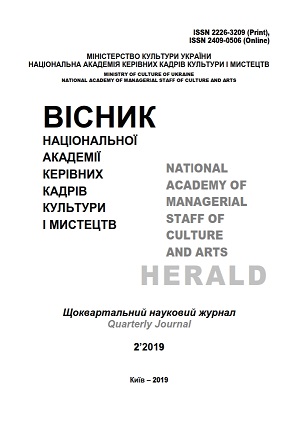Освітні процеси як основа становлення правосвідомості в першій Чехословацькій республіці (1918-1938 рр.)
Educational Processes as the Basis for the Formation of Legal Consciousness in the First Czechoslovak Republic (1918-1938)
Author(s): Myroslava Volodymyrivna Gromovchuk, Olga Oleksandrivna SydorenkoSubject(s): History of Law, History of Education, State/Government and Education, Sociology of Culture, Pre-WW I & WW I (1900 -1919), Interwar Period (1920 - 1939), Sociology of Education, Sociology of Religion, Sociology of Law
Published by: Національна академія керівних кадрів культури і мистецтв
Keywords: religious education; secular education; intercultural dialogue; cultural and educational process; legal culture;
Summary/Abstract: The purpose of the Article is to clarify the place and role of religious and secular education in the process of intercultural dialogue in the formation of the legal culture of the transitional period in the state, in particular, the period of activity of the First Czechoslovak Republic. Methodological basis - the basis of the methodology of the research is the general theoretical methods, principles, and approaches to the definition of the Constitutionally-legal consolidation of the state and church status in the First Czechoslovak Republic. In particular, the formallogical method was used to study the conceptual apparatus defined by the article's theme. Functional and comparative legal methods are used for comparative analysis of legal culture and legal consciousness in the First Czechoslovak Republic. In the process of studying legal culture and legal awareness as an element of culture in the state a structural and functional method was used. The most important is the historicalretrospective method. This method has allowed to specify the previously mentioned methodological principle of historicism and to know the laws of the genesis of legal culture and legal consciousness in the First Czechoslovak Republic. The scientific novelty consists in the systematic analysis of the factors that influence the cultural and educational process in the formation of a citizens' sense of justice. At the same time, it was first established that the main factor of the historical and cultural process in the First Czechoslovak Republic, the formation of legal culture and legal consciousness was Catholicism. It was he who also influenced the Constitutionally-legal consolidation of the right to education and upbringing, a change in the educational ideal took place: the spiritual life of man became the subject of in-depth study and acquired the highest priority of religious significance. Conclusions. In the First Czechoslovak Republic, the cultural-educational process served as a paradigm of intercultural dialogue for people of different ethnic, linguistic and religious backgrounds. The role of education in this context is defined as a strategic resource for improving the well-being of individuals in the formation of tolerance and mutual respect in the process of observance of fundamental rights and freedoms of citizens. Intercultural dialogue, in this case, is a combination of components, in particular, spiritual and secular education, in shaping a person's respect for language, religion, culture, and world outlook.
Journal: Вісник Національної академії керівних кадрів культури і мистецтв
- Issue Year: 2019
- Issue No: 2
- Page Range: 190-194
- Page Count: 5
- Language: Ukrainian

